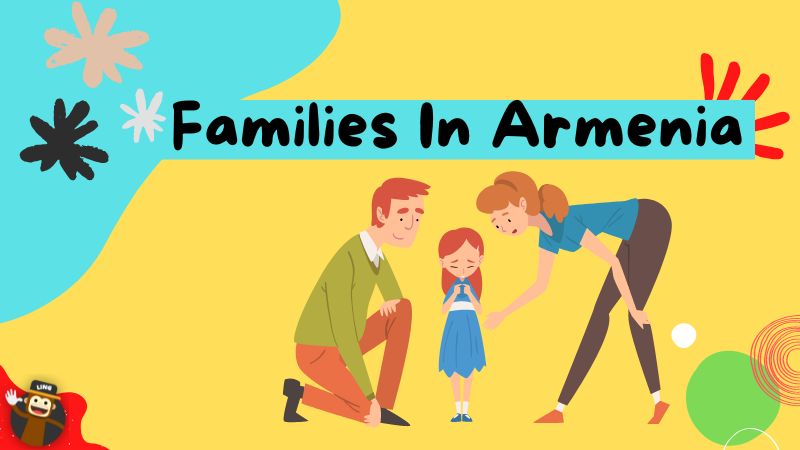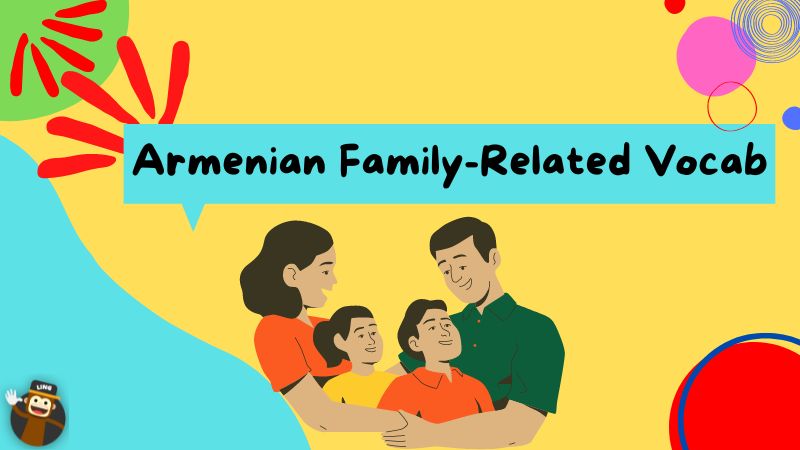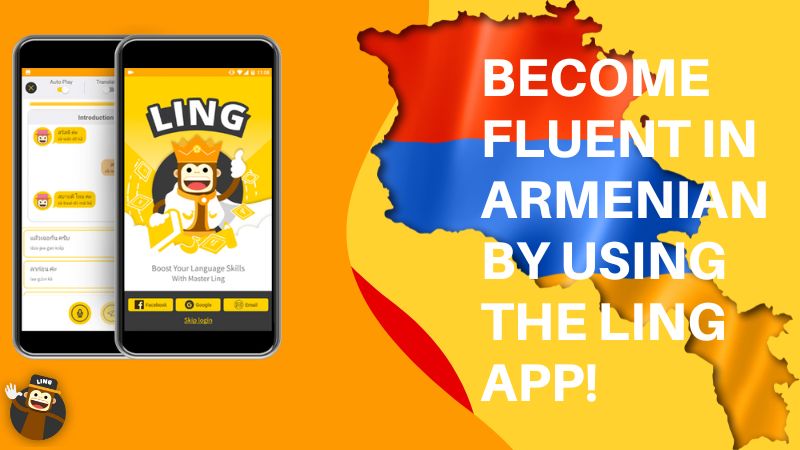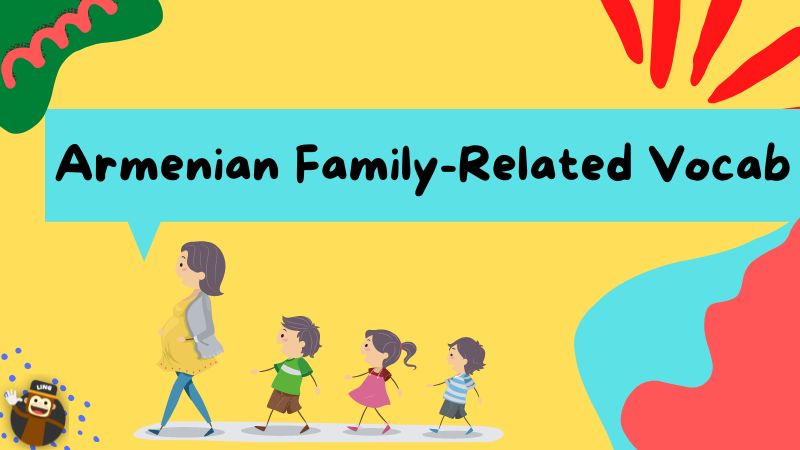Are you interested in knowing about the most common Armenian family-related vocab? In every culture in the world, family is the most important thing, so learning these words and phrases could be vital for you in the long run.
Families In Armenia

Families In Armenia
Armenia is a democratic, landlocked country located in Western Asia. It is commonly known for its cultural heritage and hospitable traditions. If we talk about the family aspect in Armenia, the people are warm and caring about their family members. They are famous for their kind nature and respect for adults.
The Family System In Armenia
Armenian people have mainly a joint family system. They have multi-generational members, including grandparents, parents, uncles, and aunts living together. Family is an essential element to Armenians, and they say children are the light of their home.
Children grow up close to their grandparents, who teach them about the importance of their culture. Kids have friendly relations with sisters, brothers, and cousins.
Gender Roles In The Family
Armenians have cultural values and traditions according to which women and men are supposed to perform their duties and responsibilities with great devotion. Women are expected to create a healthy families, and men have to run the family economically.
Women and men work shoulder to shoulder. In modern offices, women are also offered jobs.
Gender Equality In Armenian Families
In the Armenian language, women- “Kanak” are highly respected. As the saying goes, blood is thicker than water. There are specific laws regarding gender equality and equal rights for men and women, which lay the base of their legal system.
In Armenia, women and men enjoy equal rights in every aspect of life. There are strict rules against child labor, harassment, racism, and other domestic crimes.
Marital System In Armenia
Armenian families have mainly mixed cultures regarding the marital system. Most eastern Armenian families support arranged marriages. Parents mainly introduce their children to their partners. On the other hand, there are love marriages too.
Legislation System In Armenia
Armenian families have a pretty good legal system regarding family laws and legislation. All the family laws are passed out by the National Assembly and approved by the president.
They have specific rules for legislation in the family, and every family member is provided with equal rights, and the citizens humbly follow them.
Family-Related Vocabulary In Armenian

Here is a list of all the words that tend to be helpful in everyday conversation in Armenia. If you want to become a part of an Armenian family, then you must know about these words:
| English | Armenian words | Romanized Armenian |
| The brother | Եղբայրը | Yeghbayry |
| The child | Երեխան | Yerekhan |
| The children | Երեխաները | Yerekhanery |
| The daughter | Դուստրը | Dustry |
| The father | Հայրը | Hayry |
| The grandchildren | Թոռները | T’vorrnery |
| The granddaughter | Թոռնուհին | T’vorrnuhin |
| The grandma | Տատիկը | Tatiky |
| The grandpa | Պապը | Papy |
| The grandson | Թոռնիկը | T’vorrniky |
| The half-brother | Խորթ եղբայրը | Khort’ yeghbayry |
| The half-sister | Խորթ քույրը | Khort’ k’uyry |
| The husband | Ամուսինը | Amusiny |
| The mother | Մայրը | Mayry |
| The parents | Ծնողները | Tsnoghnery |
| The siblings | Եղբայրներն ու եղբայրները | Yeghbayrnern u yeghbayrnery |
| The sister | Քույրը | K’uyry |
| The son | Որդին | Vordin |
Extended Family Members In Armenian Vocabulary
| English | Armenian | Pronunciation |
| Great-grandfather | Նախապապ | Nakhapap |
| Great-grandmother | մեծ տատիկ | mets tatik |
| Uncle | Քեռի | K’erri |
| Aunt | Մորաքույր | Morak’uyr |
| Cousin (male) | զարմիկ (տղամարդ) | zarmik (tghamard) |
| Nephew | Եղբորորդի | Yeghborordi |
| Cousin (female) | զարմիկ (իգական) | zarmik (igakan) |
| Niece | զարմուհի | zarmuhi |
Other Family-Related Vocabulary In Armenian
| English | Armenian | Pronunciation |
| Brother-in-law | Խնամի | Khnami |
| Daughter-in-law | Հարս | Hars |
| Divorced | Բաժանված | Bazhanvats |
| Father-in-law | Աներ, սկեսրայր | Aner, skesrayr |
| Half brother | Կես եղբայր | Kes yeghbayr |
| Half sister | Կես քույր | Kes k’uyr |
| Married | Ամուսնացած | Amusnats’ats |
| Mother-in-law | Սկեսուր | Skesur |
| Separated | Առանձնացված | Arrandznats’vats |
| Single | Միայնակ | Miaynak |
| Sister-in-law | քույր | k’uyr |
| Son-in-law | Փեսա | P’esa |
| Stepbrother | Խորթ եղբայր | Khort’ yeghbayr |
| Stepfather | Խորթ հայր | Khort’ hayr |
| Stepmother | Խորթ մայր | Khort’ mayr |
| Stepsister | Խորթ քույր | Khort’ k’uyr |
| The in-laws | Խնամիները | Khnaminery |
| Widow | Այրի | Ayri |
Asking Questions
Here are some of the most amazing questions to ask someone in Armenia if you want to know more about their family.
| English | Armenian | Pronunciation |
| Are you the oldest child among your siblings? | Դուք ձեր քույր-եղբայրների մեջ ավագ զավա՞կն եք: | Duk’ dzer k’uyr-yeghbayrneri mej avag zava՞kn yek’: |
| Do any of your grandparents still reside with you? | Ձեր պապիկներից և տատիկներից որևէ մեկը դեռ բնակվում է ձեզ մոտ: | DZer papiknerits’ yev tatiknerits’ voreve meky derr bnakvum e dzez mot: |
| Do you and your parents frequently argue? | Դուք և ձեր ծնողները հաճա՞խ են վիճում: | Duk’ yev dzer tsnoghnery hacha՞kh yen vichum: |
| Do you believe that individuals should adopt kids from other nations? | Դուք հավատու՞մ եք, որ անհատները պետք է երեխաներ որդեգրեն այլ ազգերից: | Duk’ havatu՞m yek’, vor anhatnery petk’ e yerekhaner vordegren ayl azgerits’: |
| Do you have a spouse? | Դուք կին ունե՞ք։ | Duk’ kin une՞k’. |
| Do you need to keep your room tidy? | Պե՞տք է արդյոք ձեր սենյակը կոկիկ պահել: | Pe՞tk’ e ardyok’ dzer senyaky kokik pahel: |
| Do you resemble your mother more than your father? | Դուք ավելի շատ եք նմանվում ձեր մորը, քան ձեր հորը: | Duk’ aveli shat yek’ nmanvum dzer mory, k’an dzer hory: |
| Do you typically have any say in decisions involving the family? | Դուք սովորաբար որևէ խոսք ունե՞ք ընտանիքի հետ կապված որոշումների հարցում: | Duk’ sovorabar voreve khosk’ une՞k’ yntanik’i het kapvats voroshumneri harts’um: |
| Do your parents put any pressure on you to behave a specific way? | Ծնողներդ ինչ-որ ճնշում գործադրո՞ւմ են քեզ վրա, որպեսզի քեզ հատուկ ձևով պահես։ | Tsnoghnerd inch’-vor chnshum gortsadro՞wm yen k’ez vra, vorpeszi k’ez hatuk dzevov pahes. |
| Do your parents still house you? | Ծնողներդ դեռ տանում են քեզ: | Tsnoghnerd derr tanum yen k’ez: |
| How about your family? If not, why not? | Ինչ կասեք ձեր ընտանիքի մասին: Եթե ոչ, ինչո՞ւ ոչ։ | Inch’ kasek’ dzer yntanik’i masin: Yet’e voch’, inch’vo՞w voch’. |
| How well-adjusted are you to your in-laws? | Որքա՞ն լավ եք հարմարեցված ձեր խնամիների հետ: | Vork’a՞n lav yek’ harmarets’vats dzer khnamineri het: |
| How well-adjusted are you to your siblings? | Որքանո՞վ եք լավ հարմարված ձեր քույր-եղբայրների հետ: | Vork’ano՞v yek’ lav harmarvats dzer k’uyr-yeghbayrneri het: |
| Is there a curfew for you? | Ձեզ համար պարետային ժամ կա՞: | DZez hamar paretayin zham ka՞: |
| Do you need permission from your parents to remain out late? | Ձեր ծնողների թույլտվությո՞ւնն է տնից դուրս մնալու համար: | DZer tsnoghneri t’uyltvut’yo՞wnn e tnits’ durs mnalu hamar: |
| What is the origin of your name? | Ո՞րն է ձեր անվան ծագումը: | VO՞rn e dzer anvan tsagumy: |
| What time must you return home? | Ո՞ր ժամին պետք է տուն վերադառնաք: | VO՞r zhamin petk’ e tun veradarrnak’: |
| Who are you named after? | Ո՞ւմ անունով եք կոչված: | VO՞wm anunov yek’ koch’vats: |
| Whom do you bear your name? | Ո՞ւմ անունը կրում ես։ | VO՞wm anuny krum yes. |
| Your parents, are they strict? | Ծնողներդ, խի՞ստ են։ | Tsnoghnerd, khi՞st yen. |
Useful Sentences
Let’s also look at some useful sentences for talking about the family in Armenian.
| English | Armenian | Pronunciation |
| Do you have any memories of your grandparents? | Ձեր տատիկի ու պապիկի մասին հիշողություններ ունե՞ք: | DZer tatiki u papiki masin hishoghut’yunner une՞k’: |
| He received a bunny-themed birthday card from his granddaughter. | Նա իր թոռնուհուց նապաստակի թեմայով ծննդյան բացիկ է ստացել։ | Na ir t’vorrnuhuts’ napastaki t’emayov tsnndyan bats’ik e stats’el. |
| His niece works at a Seattle optical store. | Նրա զարմուհին աշխատում է Սիեթլի օպտիկական խանութում։ | Nra zarmuhin ashkhatum e Siyet’li optikakan khanut’um. |
| Last year, my cousin moved away to college. | Անցյալ տարի զարմիկս հեռացավ քոլեջում: | Ants’yal tari zarmiks herrats’av k’volejum: |
| My aunt enjoys telling me amusing tales about my mother’s past. | Մորաքույրս հաճույքով ինձ զվարճալի հեքիաթներ է պատմում մորս անցյալի մասին: | Morak’uyrs hachuyk’ov indz zvarchali hek’iat’ner e patmum mors ants’yali masin: |
| My brother is a fierce rival. | Եղբայրս կատաղի մրցակից է։ | Yeghbayrs kataghi mrts’akits’ e. |
| My father traveled a lot for his job. | Հայրս իր աշխատանքի համար շատ է ճանապարհորդել։ | Hayrs ir ashkhatank’i hamar shat e chanaparhordel. |
| My nephew resides in the city. Every now and again, eating lunch is pleasant. | Եղբորս տղան ապրում է քաղաքում։ Ժամանակ առ ժամանակ ճաշ ուտելը հաճելի է: | Yeghbors tghan aprum e k’aghak’um. Zhamanak arr zhamanak chash utely hacheli e: |
| She has a son and a daughter. | Ունի որդի և դուստր։ | Uni vordi yev dustr. |
| Some people have adoptive parents who raised them. | Որոշ մարդիկ ունեն որդեգրող ծնողներ, ովքեր մեծացրել են իրենց: | Vorosh mardik unen vordegrogh tsnoghner, ovk’er metsats’rel yen irents’: |
| The in-laws of many people don’t like each other. | Շատերի խնամիներն իրար չեն սիրում։ | Shateri khnaminern irar ch’en sirum. |
Learning the Armenian language

When it comes to learning a language, the interest, and concentration of the learner are needed. Our app ensures you’re always glued to our lessons, so learning feels like no kind of chore at all.
After vocabulary words, tests are taken to confirm whether the learner has a strong grip or is still in need of help. Don’t worry though, these tests aren’t like the ones you get at school; they are fun and engaging.
After this, some conversational words and sentences are taught so that a person can easily communicate with their friends and relatives.
Also, check out Armenian verbs and Armenian proverbs to enhance your spoken language!
What are you waiting for? Download Ling now from Google Playstore or App Store and start learning Armenian now!!!





















